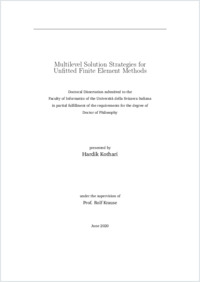Multilevel solution strategies for unfitted finite element methods
- Kothari, Hardik
- Krause, Rolf (Degree supervisor)
-
28.07.2020
151 p
Thèse de doctorat: Università della Svizzera italiana, 2020
Multigrid methods
Extended finite element method (XFEM)
CutFEM
Discontinuities
Constrained optimiztation
English
In the unfitted finite element methods, traditionally we can use Nitsche's method or the method of Lagrange multipliers to enforce the boundary/interface conditions. In this work, we present tailored multilevel methods for solving the problems stemming from either of these discretizations. Generally, multigrid methods require a hierarchy of finite element (FE) spaces which can be created geometrically using a hierarchy of nested meshes. However, in the unfitted FE framework, standard multigrid methods might demonstrate poor convergence properties if the hierarchy of FE spaces employed is not nested. We design a prolongation operator for the multigrid methods in such a way that it can accommodate the arbitrary shape of the boundaries/interfaces and recursively induces a nested FE space hierarchy. The prolongation operator is constructed using so-called pseudo-$L^2$-projections; as common, the adjoint of the prolongation operator is employed as the restriction operator. We employ this transfer operator in our multigrid method and solve the linear system of equations that arise from using Nitsche's method. In the numerical experiments, we show that our multigrid method is robust with respect to highly varying coefficients and the number of interfaces in a domain. It shows level independent convergence rates when applied to different variants of Nitsche's method. Additionally, we present a generalized multigrid method for solving the problems stemming from the discretization of the interface conditions using Lagrange multipliers. This method can be used to solve the quadratic minimization problems with linear equality/inequality constraints, efficiently. The essential component of this multigrid method is the technique that decouples the linear constraints by projecting them into a new basis. The decoupled constraints are then handled by a modified version of the projected Gauss-Seidel method. By means of several numerical experiments, we exhibit the robustness of our multigrid method for the boundary or interface conditions with respect to varying coefficients. In addition, we demonstrate that this multigrid method can also handle the inequality constraints arising from the contact problems in the unfitted framework.
- Language
-
- English
- Classification
- Computer science and technology
- License
-
License undefined
- Identifiers
-
- RERO DOC 328801
- URN urn:nbn:ch:rero-006-121324
- ARK ark:/12658/srd1319417
- Persistent URL
- https://n2t.net/ark:/12658/srd1319417
Statistics
Document views: 445
File downloads:
- Texte intégral: 342
